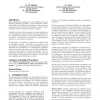Free Online Productivity Tools
i2Speak
i2Symbol
i2OCR
iTex2Img
iWeb2Print
iWeb2Shot
i2Type
iPdf2Split
iPdf2Merge
i2Bopomofo
i2Arabic
i2Style
i2Image
i2PDF
iLatex2Rtf
Sci2ools
101
click to vote
LDTA
2010
2010
Faster ambiguity detection by grammar filtering
Real programming languages are often defined using ambiguous context-free grammars. Some ambiguity is intentional while other ambiguity is accidental. A good grammar development environment should therefore contain a static ambiguity checker to help the grammar engineer. Ambiguity of context-free grammars is an undecidable property. Nevertheless, various imperfect ambiguity checkers exist. Exhaustive methods are accurate, but suffer from nontermination. Termination is guaranteed by approximative methods, at the expense of accuracy. In this paper we combine an approximative method with an exhaustive method. We present an extension to the Noncanonical Unambiguity Test that identifies production rules that do not contribute to the ambiguity of a grammar and show how this information can be used to significantly reduce the search space of exhaustive methods. Our experimental evaluation on a number of real world grammars shows orders of magnitude gains in efficiency in some cases and negli...
| Added | 06 Dec 2010 |
| Updated | 06 Dec 2010 |
| Type | Conference |
| Year | 2010 |
| Where | LDTA |
| Authors | H. J. S. Basten, Jurgen J. Vinju |
Comments (0)

